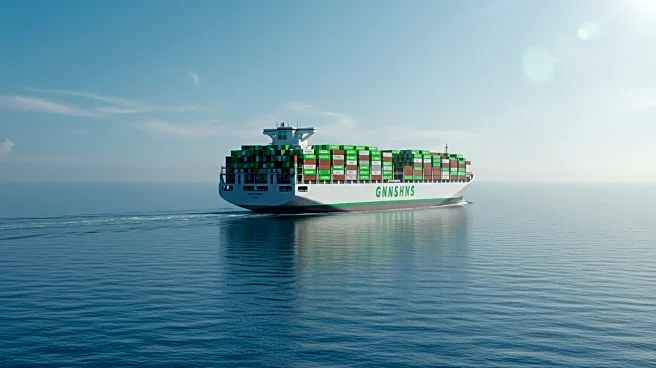What's Happening?
Wasaline, a Finnish-Swedish shipping operator, has announced its achievement of becoming the first carbon-neutral shipping company in the Baltic Sea. This milestone was reached six years ahead of its original 2030 target. The company has signed a biogas supply contract with Gasum and entered a FuelEU Maritime pooling agreement with Stena Line, allowing its Vaasa–Umeå service to operate entirely on biofuels. This development marks the creation of the first international green shipping corridor, supported by the DNV-led Nordic Roadmap. Wasaline's flagship vessel, Aurora Botnia, will undergo a battery capacity expansion to 12.6 MWh by January 2026, making it the largest battery installation on a RoPax vessel worldwide.
Why It's Important?
This achievement by Wasaline is significant as it sets a precedent for the maritime industry in terms of environmental sustainability. By reaching carbon neutrality, Wasaline not only meets but exceeds current and upcoming FuelEU Maritime requirements, positioning itself as a leader in green shipping. The initiative aligns with broader goals such as the Clydebank Declaration and Nordic zero-emission shipping targets. The collaboration with Stena Line and Gasum highlights the potential for renewable biogas as a viable solution for reducing maritime emissions. This move could influence other shipping companies to adopt similar practices, potentially leading to a significant reduction in the industry's carbon footprint.
What's Next?
Wasaline plans to continue its collaboration with industry partners to further enhance its green shipping capabilities. The expansion of biogas supply by Gasum is expected to support this initiative. Additionally, the completion of Aurora Botnia's battery capacity upgrade in 2026 will further solidify Wasaline's commitment to sustainable shipping. The success of this project may encourage other operators to explore similar green corridors, potentially leading to a broader adoption of biofuels and hybrid propulsion systems in the maritime sector.
Beyond the Headlines
The ethical implications of Wasaline's achievement are profound, as it demonstrates a commitment to environmental stewardship and corporate responsibility. By choosing to view regulatory changes as business opportunities, Wasaline sets an example for other companies to follow. This approach not only benefits the environment but also enhances the company's competitiveness in a market increasingly focused on sustainability.









